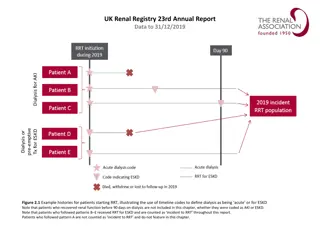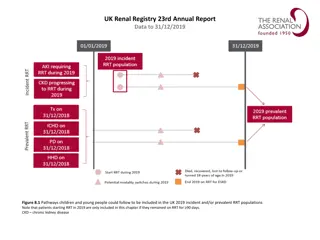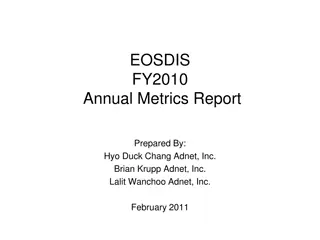
National Findings and Trends in Abortions
Explore the latest findings on abortion trends in the US, including an increase in abortion volume, the rise of telehealth services, changes in legal statuses in various states since 2024, and insights into the total number of abortions in 2024. Stay informed about the evolving landscape of abortion care delivery and legal regulations.
Download Presentation

Please find below an Image/Link to download the presentation.
The content on the website is provided AS IS for your information and personal use only. It may not be sold, licensed, or shared on other websites without obtaining consent from the author. If you encounter any issues during the download, it is possible that the publisher has removed the file from their server.
You are allowed to download the files provided on this website for personal or commercial use, subject to the condition that they are used lawfully. All files are the property of their respective owners.
The content on the website is provided AS IS for your information and personal use only. It may not be sold, licensed, or shared on other websites without obtaining consent from the author.
E N D
Presentation Transcript
Summary of findings Abortion volume is higher in 2024 than it was in 2023 or 2022. The majority of abortions occur in-person. The number of abortions delivered via telehealth continued to increase. By the end of 2024, 1 in 4 abortions was delivered via telehealth. Shield laws continue to facilitate abortion access, with an average of 12,330 abortions per month in the final quarter of 2024. Implications of these trends are unclear in the context of multiple changes in the service delivery environment: Shifting price of abortion Decreases in abortion funds to cover patient costs Election-related spikes in demand Ongoing financial pressure on brick-and-mortar clinics
Changes in legal status since January 2024 In Florida, a 6-week ban went into effect in May 2024 In Iowa, a 6-week ban went into effect in August 2024 In North Dakota, a total ban was ruled unconstitutional in October 2024 No brick-and-mortar facilities providing States with total bans as of December 2024: Alabama, Arkansas, Idaho, Indiana, Kentucky, Louisiana, Mississippi, Missouri, Oklahoma, South Dakota, Tennessee, Texas, West Virginia States with 6-week bans as of December 2024: Florida, Georgia, Iowa, South Carolina
Total abortions in the US have increased since Dobbs Source: Society of Family Planning, June 2025
US abortions totaled 1.14 million in 2024 Source: Society of Family Planning, June 2025
Monthly average number of abortions increased each year Source: Society of Family Planning, June 2025
The monthly number of abortions increased each year Source: Society of Family Planning, June 2025
By Q4 of 2024, 1 in 4 abortions were provided via telehealth Source: Society of Family Planning, June 2025
In-person abortion care declined slightly, while telehealth grew Source: Society of Family Planning, June 2025
The majority of abortions still take place in-person Source: Society of Family Planning, June 2025
The proportion of abortions provided via telehealth varied by state, 2024 Source: Society of Family Planning, June 2025
Abortions provided by virtual-only clinics have increased since Dobbs Source: Society of Family Planning, June 2025
Abortions provided under shield laws have increased since this route to care became available Source: Society of Family Planning, June 2025
Legal climates appear to play an important role in telehealth use Source: Society of Family Planning, June 2025
Half of abortions provided via telehealth in 2024 were facilitated by shield laws 2024 monthly average number of abortions In-person Telehealth Abortion and telehealth permitted 60,780 10,360 Abortion permitted, telehealth restricted 8,610 1,610 6-week abortion ban, telehealth restricted 5,350 2,080 Abortion is totally banned 30 6,350 Source: Society of Family Planning, June 2025
Alabama Source: Society of Family Planning, June 2025
Alaska Source: Society of Family Planning, June 2025
Arizona Source: Society of Family Planning, June 2025
Arkansas Source: Society of Family Planning, June 2025
California Source: Society of Family Planning, June 2025
Colorado Source: Society of Family Planning, June 2025
Connecticut Source: Society of Family Planning, June 2025
Delaware Source: Society of Family Planning, June 2025
District of Columbia Source: Society of Family Planning, June 2025
Florida Source: Society of Family Planning, June 2025
Georgia Source: Society of Family Planning, June 2025
Hawaii Source: Society of Family Planning, June 2025
Idaho Source: Society of Family Planning, June 2025
Illinois Source: Society of Family Planning, June 2025
Indiana Source: Society of Family Planning, June 2025
Iowa Source: Society of Family Planning, June 2025
Kansas Source: Society of Family Planning, June 2025
Kentucky Source: Society of Family Planning, June 2025
Louisiana Source: Society of Family Planning, June 2025
Maine Source: Society of Family Planning, June 2025
Maryland Source: Society of Family Planning, June 2025
Massachusetts Source: Society of Family Planning, June 2025
Michigan Source: Society of Family Planning, June 2025
Minnesota Source: Society of Family Planning, June 2025
Mississippi Source: Society of Family Planning, June 2025
Missouri Source: Society of Family Planning, June 2025
Montana Source: Society of Family Planning, June 2025
Nebraska Source: Society of Family Planning, June 2025
Nevada Source: Society of Family Planning, June 2025
New Hampshire Source: Society of Family Planning, June 2025
New Jersey Source: Society of Family Planning, June 2025
New Mexico Source: Society of Family Planning, June 2025
New York Source: Society of Family Planning, June 2025
North Carolina Source: Society of Family Planning, June 2025





















